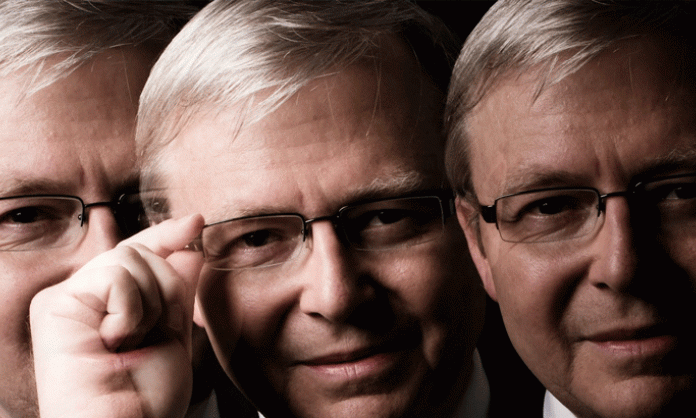Under a new leader, the ALP has moved into the second wave of its long campaign for a third term in office. Labor’s strategy seems clear enough: win back the seats it can (mainly Qld), hold those it must (mostly NSW).
Its tactic is on one hand to remind us of the party’s so-called tremendous legacy; on the other it is to convince us that it can deliver something improved.
Yet the ALP’s orientation doesn’t inspire much hope that this is a transformed outfit.
Kevin Rudd has challenged opposition leader Tony Abbott to debate three issues: debt and deficit, refugees and a price on carbon. Each in turn will likely be positively snoozeworthy. Not because the issues aren’t important, but because all indications are that both men agree on so many premises yet will use every ounce of their rhetorical abilities to convince us that they are poles apart.
An exchange on refugee policy will by and large be restricted to which party can best “stop the boats”. There will of course be the standard denunciations of “people smugglers”. That the real targets of punitive policies are the people seeking asylum is clear enough from the hysteria about how many are seeking refugee status.
Rudd reportedly wants to move from the carbon tax, which pushed the cost burden of polluting companies onto consumers, to an emissions trading scheme, which will allow corporations to trade and profit from carbon credits. So we should expect a session full of talk about trade-offs between the environment and the economy from two leaders who have long since made it clear that the former will be sacrificed in the interests of the rich. It will be as convincing as Marius Kloppers carrying on about Aboriginal land rights.
A debate on debt and deficit will not be a stoush over whether to ditch the neoliberal dogmas embraced by both parties for the last 30 years – lowering corporate taxes while attacking services that workers and the poor depend on, privatisation, etc. Instead it will revolve around who can best manage the books in the long term, weighing up the human rights of the working class against the alleged responsibility of government to give the capitalist class whatever it asks.
Yet there is at least some degree of interest in the ALP’s reshuffle, evidenced by the sharp turn in Labor’s fortunes in the polls. Some of this is no doubt the natural boost that a change in leadership usually gives a flailing party. Some of it will be a genuine hope that Labor might deliver something better than it has thus far. Some of it will be due to swingers attracted more to Rudd than to Abbott, but who, for whatever reasons, nevertheless found Abbott more appealing than Gillard.
Rather than, at this early stage, getting caught up in the maelstrom of electoral politics, the left needs to keep focussed on doing the small things that can help rebuild the union movement, and involve ourselves in campaigns that can draw new people into activity on the streets.
Those sorts of endeavours are important because they can give people a sense of their collective interests, and of their collective power where there is a victory, such as those that workers at the Woolworths Hume Distribution Centre have managed over a few years (see “Workers’ and union reports”).
The task for the left is also to continue to argue for an alternative to the pro-capitalist parties, and for a system built on cooperation rather than competition.
The small victories and campaigns, informed by a politics of solidarity and struggle, help to develop new layers of activists who are capable of standing on their own feet, rather than simply hoping that politicians will deliver something from on high.
Given what is actually on offer in parliament, it is vital that we contribute to that process of rebuilding and regrouping wherever we can.
A lurch to the right on refugees
The ALP is shifting its already anti-human suite of refugee policies further to the right (see p. 7). Labor’s plan is for reworked criteria making it more difficult to obtain refugee status, and more forced deportations among other things.
The asylum seeker debate has, as a result, taken another ugly turn. In order to sell the shift, the party is suggesting that people arriving by boat are undeserving of assistance. The prime minister, the foreign minister and the immigration minister have resorted to outright lies or gross distortions about the legitimacy of the claims and motivations of recently arrived refugees.
The government’s shift to the right has been matched by the coalition, which has raised the prospect of using the military not only to tow boats back into Indonesian waters, but to board merchant vessels carrying asylum seekers in order to prevent them landing on Australian territory.
These are disgraceful lengths to go to avoid extending a hand to people in desperate need.








